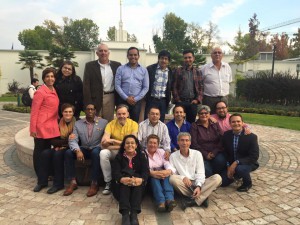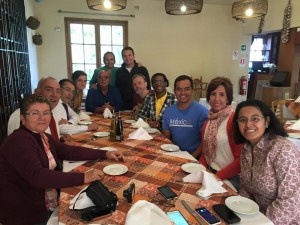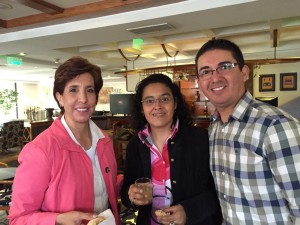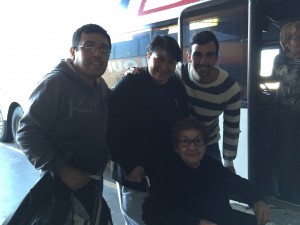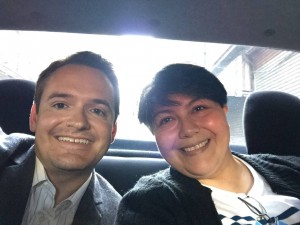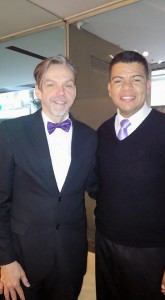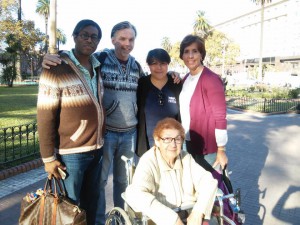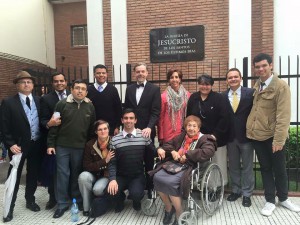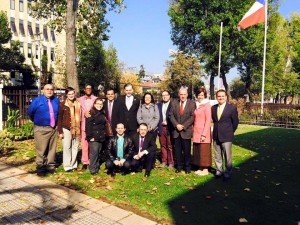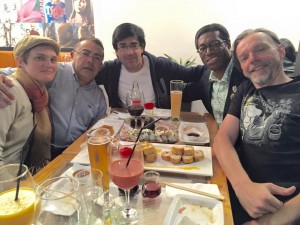LGBT Mormons in Latin America Finding Wholeness Together
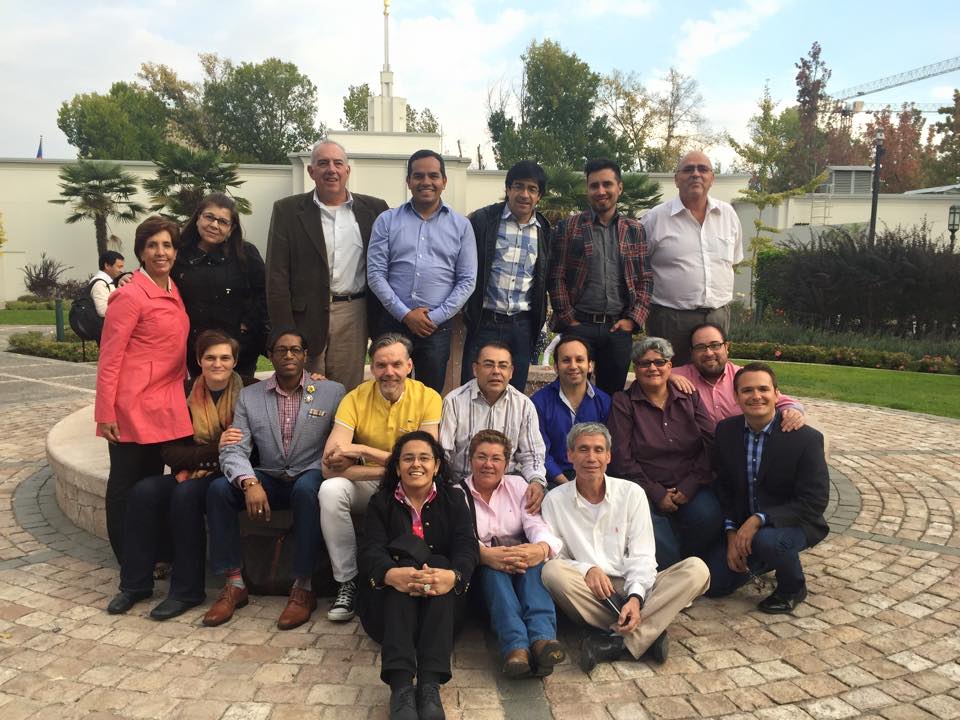
By John Gustav-Wrathall
I had the enormous privilege of participating in two of the three Affirmation conferences in South America, in Santiago, Chile (May 1-3) and in Buenos Aires, Argentina (May 8-10). (The weekend prior to the Santiago conference, April 24-26, a conference was held in Lima, Peru.) The gatherings were smaller than the two conferences I attended in Mexico City last year (in February and November 2014), but the participants came with open hearts, right from the beginning sharing the most vulnerable elements of their journeys and their lives: their uncertainties their hopes, their pain and their questions, their skepticism and their faith. In the crucible of the Spirit, we forged bonds of sisterhood and brotherhood that can’t be dissolved by time or by distance. Together we faced big questions, the biggest kinds of questions it is possible to face in life. We didn’t find answers – we couldn’t hope to find answers to such questions. But we found solace in brotherhood and sisterhood, we found hope in the ultimate wholeness that the Gospel promises all of God’s children, and we found direction in the still, small voice of the Spirit.
The greatest comfort to me at the conference were the profound and vulnerable expressions of faith in the Restored Church and in the Restored Gospel. At all of the Latin American conferences I’ve attended, I’ve always been deeply inspired by the tenacious commitment to both Church and Gospel among our LGBT LDS brothers and sisters. Yet, in looking back one of the gathering participants I feel most profoundly grateful for my brother Elias in Santiago, who was most unabashed in his expressions of doubt and skepticism. I am grateful to him because he was not afraid to say what he thought, in the most frank way possible. In our gatherings it is essential that we be able to speak our truth, and I can’t help but believe that in any gathering where Elias participates, truths will be fearlessly spoken. More importantly, I am grateful to him because his presence showed just how unconditional our love for one another can be. Our love for each other wasn’t based on perfect alignment of perspectives or opinions. It was grounded in our humanity, in our vulnerability, in our respect for the sanctity of every soul present. Love was the great truth.
One of the most consistent themes of the conference was expressed in the many testimonies born by LGBT Mormons who in the face of great personal anguish and intense loneliness, found strength through their relationship with God. Carmen Paz spoke about her relationship with God at the Santiago conference and Roxana Lopez addressed this theme in Buenos Aires. Sometimes personal experiences of God’s love and acceptance came as a surprise to individuals who didn’t believe themselves worthy of it. At other times, trust in our ability to turn to God and receive guidance and solace was a constant that helped individuals to navigate challenges even when no one else was there for them. One of the most moving moments of the conference came in watching a video recently produced by USGA, in which lesbian, gay and bisexual BYU students bore testimony that God is there for all of us, and that we all – regardless of sexual orientation or gender identity – can be blessed by the healing and solace that comes in calling on Christ’s atonement.
Joaquin Sepulveda and Marcelo Fuentes (in Santiago) and Ezequiel Rojas (in Buenos Aires) took up the theme of self-acceptance. Ezekiel spoke eloquently about his journey of self-acceptance in relation to his sexuality; but then his talk took an unconventional turn as he described his process of realizing that his journey of self-acceptance wasn’t complete until he had come to accept his testimony. Toward the end of the conference, Ezekiel bore testimony of the insight he had received that his faith is not contingent on his status in the Church or on what others think of him, but on the desires of his heart and his testimony, which no one can take away.
Ezekiel’s parents and his niece were at the conference. During the discussion after his talk, as we discussed the relationship between self-acceptance and our relationship with God, Ezekiel’s father spoke up about his fierce love for his son, and his pride in him. “How could I not love him?” he said, “He is a part of me.” Lourdes Peña Alguin traveled from Mexico City to speak at the Chile and Argentina conferences about family relationships and about her experience as the mother of a gay son. She spoke about her own journey from total ignorance about homosexuality to a growing sense of awe and gratitude for the LGBT Mormons she has come to know. She described how she had been surprised to discover individuals of tremendous faith, courage, and patience. Conference participants were moved by her gentleness and grace. In recognition of Mother’s Day, her son captured all of our feelings when he sent her a message thanking her for making the sacrifice necessary to travel to these conferences, in order to support and strengthen LGBT Mormons. Marcia Sepulveda, Joaquin’s mother, was present at the Santiago conference bearing witness of her pride in her son, and her unconditional love for him. Roxana Lopez’s mother, though needing to use a wheelchair most of the time in order to get around, traveled for eleven hours by bus with her daughter. Throughout the conference, she expressed her love for her daughter. “If I were to reject my own daughter because she was a lesbian,” she told one conference participant, “I would be the one who is sick. Not my daughter!”
Though encouraging to witness so many testimonials of unconditional love and support from the family members who were present, the poignancy of their testimonies was a reminder of the far too many LGBT individuals who experience misunderstanding and rejection in their families. But if family relationships can be a challenge, it was the relationship of LGBT individuals with the Church that generated some of the most challenging discussions at the conferences. In my own talk on this subject, I shared my own experience of the joy that can be experienced as as members of the Church, both gay and straight, actually let the Church be a place where we practice the Gospel with each other. But participants at both conferences expressed concern rejection by Church leaders and members resulting in alienation, depression and suicide. Others described anxiety, frustration and doubt as factors that led them to drop out of Church. Perhaps the most intimate and poignant part of the conference for me was when one participant described his conversion to the LDS Church. He described the joy that the Gospel and brought him shared his own beautiful testimony of the Gospel and the joy that came from serving a faithful mission. Now, less than a year since his mission, he faces a disciplinary council and possible excommunication. His love for the Gospel and for the Church remains undimmed, though he does not believe it is good for gay individuals to walk alone through life without possibility of companionship.
One conference participant also bore his testimony of the Church, but described having fallen inactive after the failure of his hopes that Church activity and faithfulness could transform or cure him of his homosexuality. After ten years of inactivity, he confessed a renewed yearning to go back to Church, though he didn’t quite know how to go about it. His participation in the Affirmation conference was motivated at least in part by that yearning. At both the Santiago and Buenos Aires conferences, Sunday morning attendance at the nearest LDS ward was planned for any who wanted. This individual ended his ten years of inactivity by going to Church again for the first time with a dozen other LGBT Mormons as part of the Affirmation conference.
We attended Church in Santiago on Fast and Testimony Sunday. Toward the end of the testimony meeting, Randall Thacker bore his testimony, described Affirmation’s mission, and shared with the congregation the fact that Affirmation members were present, attending as a group. After the meeting ward members and leaders approached Randall and other members of the group. Ward leaders and missionaries expressed their sense that Affirmation was doing a good thing by helping LGBT Mormons to reconcile their sexuality and their faith, and providing support to those who desired to be active in the Church. Members of the ward who had LGBT family members also came to us and expressed thanks for our presence. When Beth Ellsworth, my husband Göran and I were at the Santiago airport, we were approached by one of the workers in a souvenir shop. He introduced himself as a member of that same ward and struck up a conversation with us. He also expressed gratitude for Affirmation’s work and presence, and then eventually shared with us the fact that his brother was gay, and his hope that Affirmation could be a resource to his brother. In Buenos Aires, Randall also spoke with a member of the bishopric, who expressed gratitude for the work Affirmation is doing.
A camera crew was present filming the Buenos Aires sacrament meeting because of local media interest in the rededication of the Buenos Aires temple. It just happened that a dozen individuals had been baptized the preceding Saturday, so there where twelve confirmations in a row. It took about a half an hour for all the confirmations to be completed. During our own Affirmation testimony meeting, held separately after we had returned to the conference site, Randall commented on how moving it was to hear each prayer for the newly confirmed member to “receive the Holy Ghost.” It was a reminder to him of the importance of each of us being willing to “receive the Holy Ghost,” and he bore testimony of our ability to have the Spirit with us, if we sought it.
In Santiago and Buenos Aires, we took time to discuss local organization, and ways to strengthen ministry to and with LGBT Mormons, their families and friends in these areas. The focus was on pragmatism, cooperation, and staying focused on the four pillars of Affirmation’s mission and vision. The focus is not on particular institutions or organizations, but on providing the most effective service to LGBT Mormons in need.
One of the things that stayed with me was part of a talk by a member of the Stake Presidency at the sacrament meeting in Buenos Aires. He quoted the section of the Book of Revelation that described the Saints worshiping at the altar in the temple of God. He told us that in a way the temple altar described in the Book of Revelation is our own hearts, and we are the Saints worshiping at that altar. He wanted to remind us that it is our faith and our devotion to God that makes the temple a sacred place, not the type of building it is. This was a comforting reminder to me of the power of faith. It is not in the outward edifice, not in our “persona” that God is worshiped, but in our hearts.
It is there, in our hearts, where we know what the Spirit has to teach us, where we find the comfort we need, and the direction we need in order to live lives of faith, hope and charity. It is there where we begin to find the answers we so desperately need, through doing, through acting, through blessing the lives of all we touch.
